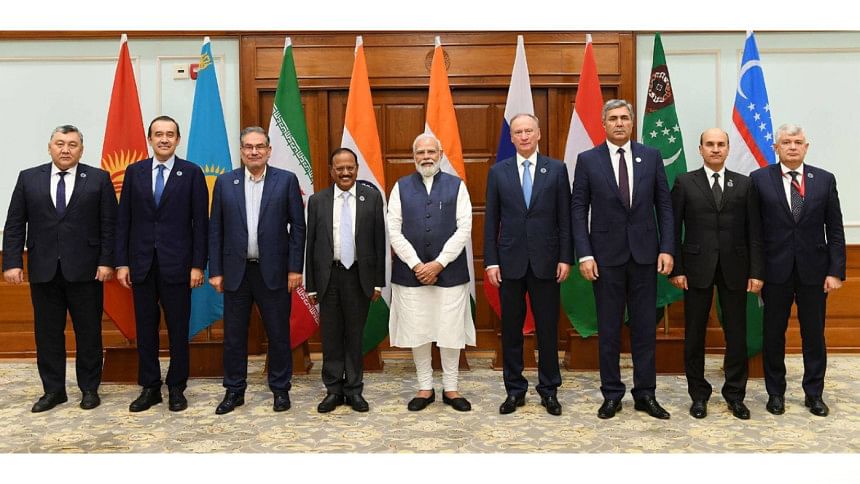National security advisers of 8 countries meet in India to discuss Afghanistan situation

In a veiled message to Pakistan, top national security advisers of eight Asian countries today got together for the first time in New Delhi and called for a peaceful, secure and stable Afghanistan and non-interference in its internal affairs.
A declaration adopted by the meeting of the security officials emphasised that Afghanistan's territory should not be used for sheltering, training, planning or financing any terrorist acts, reports our New Delhi correspondent.
The meeting was attended by national security advisers and secretaries of India, Iran, Kazakhstan, Kyrgyzstan, Russia, Tajikistan, Turkmenistan and Uzbekistan.
However, national security chiefs of China and Pakistan, two key neighbours of Afghanistan, stayed away from the meeting in New Delhi.
India hosted the meeting in a bid to firm up a common approach for practical cooperation in confronting increasing threats of terrorism, radicalisation and drug trafficking following the Taliban's takeover of Kabul.
In his opening remarks at the meeting, India's National Security Adviser Ajit K Doval said recent developments in that country have important implications not only for Afghan people but also for the whole region.
The declaration expressed deep concern over the suffering of the people of Afghanistan arising from the security situation and condemned the terrorist attacks in Kunduz, Kandahar, and Kabul.
The meeting condemned in the strongest terms all terrorist activities and reaffirmed firm commitment to combat terrorism in all its forms and manifestations, including its financing, dismantling of terrorist infrastructure and countering radicalization, to ensure that Afghanistan would never become a safe haven for global terrorism.
The declaration called for a collective cooperation against the menace of radicalization, extremism, separatism and drug trafficking in the region.
It also stressed the necessity of forming an open and truly inclusive government that represents the will of all the people of Afghanistan and has representation from all sections of their society, including major ethno-political forces in the country.
"Inclusion of all sections of the society in the administrative and political structure is imperative for the successful national reconciliation process in the country," said the declaration.
The meeting said the United Nations has a central role to play in Afghanistan and that its continued presence in the country must be preserved.
It emphasized the importance of ensuring that fundamental rights of women, children and minority communities are not violated.
The declaration expressed concern over the deteriorating socio-economic and humanitarian situation in Afghanistan and underlined the need to provide urgent humanitarian assistance to the people of Afghanistan.
It reiterated that humanitarian assistance should be provided in an unimpeded, direct and assured manner to Afghanistan and that the assistance is distributed within the country in a non-discriminatory manner across all sections of the Afghan society.
Later, the top security officials of the eight countries jointly called on Indian Prime Minister Narendra Modi who was understood to have been apprised about the discussions at the 'Delhi Regional Security Dialogue on Afghanistan.'

 For all latest news, follow The Daily Star's Google News channel.
For all latest news, follow The Daily Star's Google News channel. 




Comments